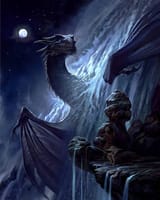Search Results
6/8/2025, 4:00:14 PM
The codifying difference is in how the fantastical elements are shown and put around in the world. A good example would be something like a Tiefling (or Cambion). In a fantasy world where everyone is a human, but a guy fucked a demon and the baby ended up with horns, this feels authentic, perhaps tragic, and interesting fantasy milieu on the nature of what it means to be a human and the morality of ones birth and parents; I think if you ran a "Magical Realism" style Quest with just one of these half demon people, it would be an interesting hook able to justify all of its fantastical elements and story all at once. But the moment you call them "Tieflings" and introduce them as a racial choice in the core rulebook, they become part of the "freakshit" epidemic in fantasy, a representation of everything wrong with the genre. Premodern humans didn't think there were supernatural crystals that had XY and Z mana charges in them, they thought crystals were magic because when they dug them up they looked extremely cool and made light do weird things when focused through them. Magic effects and creatures are hidden from sight (because "magic" in real life doesn't do shit and fairies aren't real), and as such people in the past believed in them only so far as their lack of understanding of the natural world allowed (and maybe a little more, if they're trying to discipline naughty children). Making these things "real" and "apparent" feels less authentic.
So the answer is obvious; don't use generic fantasy tropes. Create a fantasy milieu based on a real (or made up) culture focusing on immersion and realism; the "real" elements of the world blending with the supernatural. Diseases are actually caused by spiritual maladies, maggot appear via autogenesis onto rotten meat, things occur because of the will of spirits; and HUMAN ONLY!!!! Or at least, the main focus (naturally). Look at other fantasy authors less influenced by Tolkien; human mythology and folklore, the Bible, Howard, Moorcock, Vance, etc.
But the trouble? I like generic fantasy.
It's become so codified and common it is its own genre, separate from the greater genre of "fiction", in which ahistorical and magical elements mixed with science fiction and the supernatural. The nuFantasy is just fun. People want to have their own version of it; worldbuilding setting with fantastical characters and magic and supernatural environments. People want to play in worlds like this, and they clearly have some kind of draw. So how do you make fantasySLOP good? That's the real question; and the one I'm also interested in solving.
So the answer is obvious; don't use generic fantasy tropes. Create a fantasy milieu based on a real (or made up) culture focusing on immersion and realism; the "real" elements of the world blending with the supernatural. Diseases are actually caused by spiritual maladies, maggot appear via autogenesis onto rotten meat, things occur because of the will of spirits; and HUMAN ONLY!!!! Or at least, the main focus (naturally). Look at other fantasy authors less influenced by Tolkien; human mythology and folklore, the Bible, Howard, Moorcock, Vance, etc.
But the trouble? I like generic fantasy.
It's become so codified and common it is its own genre, separate from the greater genre of "fiction", in which ahistorical and magical elements mixed with science fiction and the supernatural. The nuFantasy is just fun. People want to have their own version of it; worldbuilding setting with fantastical characters and magic and supernatural environments. People want to play in worlds like this, and they clearly have some kind of draw. So how do you make fantasySLOP good? That's the real question; and the one I'm also interested in solving.
Page 1
